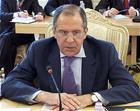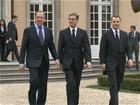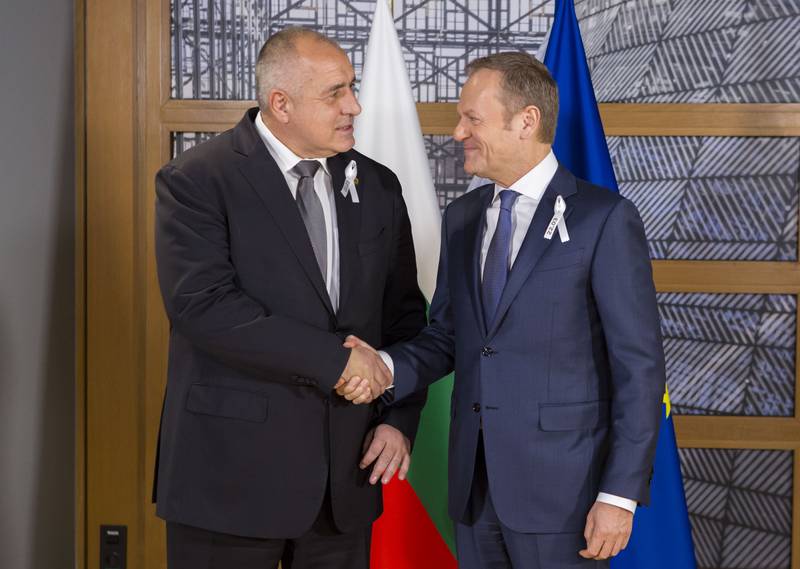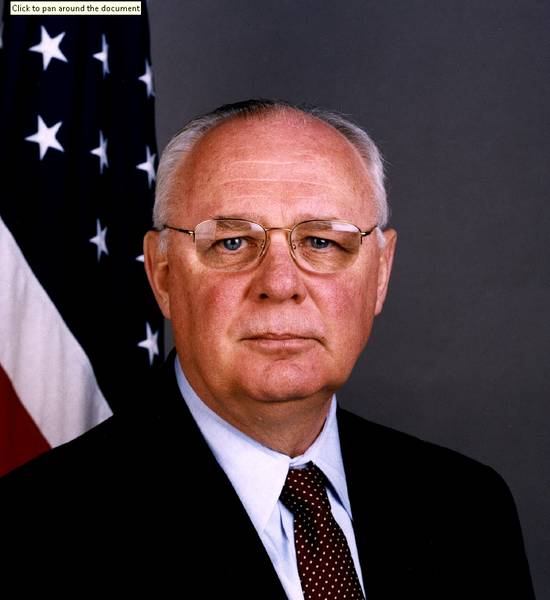Sergey Lavrov: There Is No Contradiction Between Values and Interests
Adelina Marini, March 23, 2012
 After the election of Vladimir Putin again for president of Russia on March 4, fears have not disappeared what the country's foreign policy will be. This is why, quite on time the long serving (since 2004) Minister of Foreign Affairs Sergey Lavrov gave an extensive interview (in Russian) for Konstantin von Eggert with the Kommersant radio. In this interview answers can be seen to many of the questions, which the West is asking. In the course of 45 minutes Lavrov is talking about Belarus, Russia's relations with Europe and USA, about Moscow's positions on the developments in Syria, about the danger of an Iranian nuclear bomb and about Afghanistan. However, I will draw your attention only to the questions about Belarus, the EU and the anti-ballistic missile system (ABMS).
After the election of Vladimir Putin again for president of Russia on March 4, fears have not disappeared what the country's foreign policy will be. This is why, quite on time the long serving (since 2004) Minister of Foreign Affairs Sergey Lavrov gave an extensive interview (in Russian) for Konstantin von Eggert with the Kommersant radio. In this interview answers can be seen to many of the questions, which the West is asking. In the course of 45 minutes Lavrov is talking about Belarus, Russia's relations with Europe and USA, about Moscow's positions on the developments in Syria, about the danger of an Iranian nuclear bomb and about Afghanistan. However, I will draw your attention only to the questions about Belarus, the EU and the anti-ballistic missile system (ABMS).
Belarus
This is the first question, which Konstantin von Eggert starts his interview with. By the way, the journalist (a former BBC Moscow bureau chief) was recently in Bulgaria on the invitation of the Sofia office of the European Council on Foreign Relations to try and shed more light to today's Russia, the presidential elections and the tools which the new old president Vladimir Putin has at his disposal. The situation in authoritarian Belarus is becoming more and more worrying after two alleged perpetrators of the Minsk underground bomb attack were sentenced to death. The attack took place in April 2011, when 15 people were killed and hundreds were injured. Belarus is the only European country that still has capital punishment. This is a case that caused sharp reactions from the EU, the foreign ministers of which extended again the ban list for Belarus officials.
From the answers of the Russian foreign minister it becomes clear that he does not feel comfortable to speak about Russia's close relations with Belarus and on the issue about the cooperation between Moscow and Minsk he seems distanced. He recalls that Russia has introduced a moratorium on capital punishment but to the question whether some bilateral contacts are envisaged, during which the Belarussian authorities to be told that their actions are unacceptable, Lavrov sent the ball to the EU playground, saying that Russia is interested Belarus to be accepted as a full member of the Council of Europe - organisation, devoted to defending human rights.
"These artificial hurdles, put on this road by some Western and Central European countries, we consider worth a pity. I am convinced that moving toward full membership in the Council of Europe will ensure a solution to the problem with capital punishment, because revoking it is one of the conditions for membership".
The values, interests and the EU
One of the main criticism in the EU-Russia relations is disrespect of human rights in Russia and pursue of interests at the expense of values. Asked what is more important - values or interests - Mr Lavrov was quite clear, saying that if the matter is not approached via double standards, then an unsurmountable obstacle would not be found between the two. However, he asked: "And after all, what are the values? Values in the universal meaning are what is included in the joint declaration of human rights, endorsed a little after World War II, right after the creation of the UN. This declaration contains, I will say it again, universal, acceptable for all countries in the world, approaches for guaranteeing, respecting of human rights. There are attempts additional visions to be sewed onto these universal approaches, as is the case with sexual minorities. We are trying to protect our society from the homosexual propaganda and this sporadically evokes nervous reactions from the EU".
Moreover, Sergey Lavrov explained, that in terms of interests, every normal country, "and I hope that Russia is precisely such a country and is perceived as such", does not pursue its interests at the expense of protection and guaranteeing of the rights and freedoms of its citizens. While elaborating on this, that it is in normal states' interest to subject their foreign policy to internal development, he gradually went on to attack the rhetorics in the election campaigns in some Western countries. At the moment there are intensive campaigns in the US and France. "Regarding the influence of foreign policy rhetoric in domestic policy, you know that in my long service I observe how election campaigns pass in foreign countries and how, for instance, sounds the Russian topic there. This for us is a direct interest".
According to the Russian foreign minister, foreign policy rhetoric in the election campaign in Russia was much more modest compared to the campaigns in the US and France.
Anti-ballistic missile defence
One of the points of tension in the relations of Russia with the US and NATO countries in Europe are American plans to build anti-missile defence near Russian borders. Plans, which cause nervousness in Moscow and constant threats for counter actions. Sergey Lavrov explains very extensively what this tension is due to. He says that for Russia it is crystal clear that neither the US nor NATO has the intention of attacking Russia. Such assurances, he said, the country is receiving every day and even every hour. "We are constantly told 'But why are you concerned, we have no such intentions and even capabilities to attack you'. But a wise man, I think it was Bismarck, said that in military affairs the main thing are not intentions but potential".
Lavrov explains further in the interview that the reason for the Russian concerns is the flaws between words and actions. According to him, Russia is regularly inviting its partners to sign "in clear language" guarantees that the system is not directed to anybody in the European region, to develop strict geographical technical criteria, to which, the diplomat says, the following answer is received: "But don't you believe us? This is not against you, don't worry".
Russia does not agree with the conditions it is being offered in order to stop opposing the ABMS construction, mainly because of the unilateral approach. "And this approach, to the least, is not a manifestation of respect to the intellectual capabilities of our country". In November 2010, in the framework of the NATO summit in Lisbon, an agreement has been reached the Alliance and Russia to discuss further cooperation in anti-missile defence and to make a joint assessment of the threat of ballistic missiles and to continue the dialogue in this area.
A new agreement with the EU? Hardly
By the way, the issue of respect and underestimation of Russia is present like a think thread in the entire interview of radio Kommersant with Sergey Lavrov. He says a number of times that Russia wants and will stick to its right to be treated on equal  footing by its partners. In this regard, as telling is the statement (Russian) of the Russian foreign minister after his meeting on March 21st with his colleagues from Germany and Poland - Guido Westerwelle and Radek Sikorski. Between Russia and the EU there is no partnership agreement for some years now, because the previous one expired in 2009 and ever since then the efforts to renew it fail. Nonetheless, Russia now has an advantage because it has won the 18-year old battle for membership to the World Trade Organisation - a battle often led by the EU as a means for leverage on Moscow.
footing by its partners. In this regard, as telling is the statement (Russian) of the Russian foreign minister after his meeting on March 21st with his colleagues from Germany and Poland - Guido Westerwelle and Radek Sikorski. Between Russia and the EU there is no partnership agreement for some years now, because the previous one expired in 2009 and ever since then the efforts to renew it fail. Nonetheless, Russia now has an advantage because it has won the 18-year old battle for membership to the World Trade Organisation - a battle often led by the EU as a means for leverage on Moscow.
From Lavrov's interview it becomes clear that Russia had not forgotten this attempt of Europe to use its weight to help Russia become a WTO member in exchange for concessions of its own interest. "Indeed, two and a half years ago these negotiations stalled because the sides did not manage to agree on the content of the section, covering trade and investment regime. Then an understanding was reached that these issues had to wait for the final agreement of the conditions for Russia's entry into the WTO. Now that this is already a fact, the trade-investment regimes we have agreed with our partners in the organisation are already clear. ... In the same time, our partners from the European Commission decided to try and gain from Russia more then what was the subject of agreement in the framework of WTO and did not seem prepared at that stage to reproduce in the trade section of the new basic agreement EU-Russia the conditions, which were worked out with us upon our entry into WTO".
According to the Russian foreign minster, the EU wanted something like a "WTO plus", which Russia disagrees with. This would mean, he explained, the 18 years of negotiations to be reviewed for the benefit of the EU. "We do not exclude that there could be probably additional agreements between Russia and the European Union, that could go beyond the regimes, which we agreed within WTO. But the WTO agreements have to be ratified first, to be given time to work and then to talk about any complements whatsoever. A new basic agreement with the EU is possible only in the context of reproduction of the trade part of the agreements in WTO".
From Sergey Lavrov's interview, so extensive and touching upon so many important issues from the global agenda, it becomes clear that probably he will continue to be a foreign minister. Asked to comment on an article of Vladimir Putin's that was published before the elections and titled "Russia in a Changing World", Sergey Lavrov says clearly: "this is a large scale geopolitical document, which outlines our visions, the visions of the then candidate and now an elected president of the Russian Federation". It also becomes clear that Russia does not have anti-Western visions if only its relations with Americans and Europeans develop on an equal footing. "We lead our own independent foreign policy, but abiding fully by our obligations as a responsible member of the international community".
 Boyko Borissov, Donald Tusk | © Council of the EU
Boyko Borissov, Donald Tusk | © Council of the EU Boris Johnson | © Council of the EU
Boris Johnson | © Council of the EU James W. Pardew | ©
James W. Pardew | ©